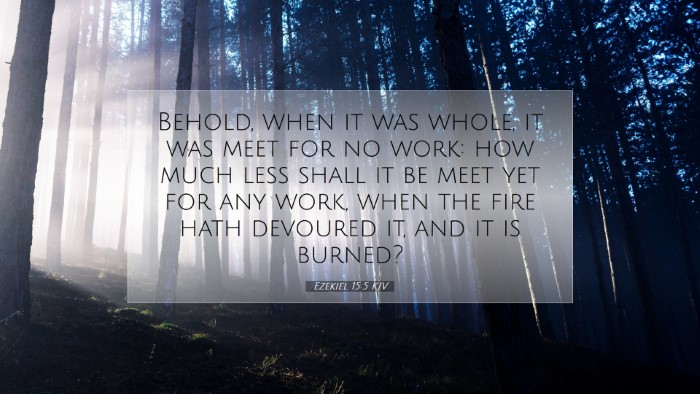Bible Commentary on Ezekiel 15:5
Ezekiel 15:5 states: "If it was all good for nothing, can it be made into anything? Or, could anyone use it for something?" (paraphrase)
This verse is part of a larger discourse where God, through the prophet Ezekiel, uses an analogy of a vine to illustrate Israel's state and its relationship with Him. It is important to note the significance of the vine in the biblical context, especially in its representation of the people of Israel.
Contextual Background
The metaphor of the vine is not only central in Ezekiel but appears throughout the Scriptures. It represents the nation of Israel, cultivated by God with the expectation of producing good fruit. God tended this vine with care, providing all it needed to flourish. However, the abandonment of God by Israel transformed the nation into something useless, much like a vine that bears no fruit.
Commentary Insights
-
Matthew Henry:
Matthew Henry expounds on the symbolism of the vine and emphasizes its purpose: "In this parable, the vine symbolizes Jerusalem and the people. A vine can only be useful if it produces fruit. Thus, God's inquiry serves as a rhetorical device illustrating the futility of a failed covenant." Henry remarks that the vine's incapacity to fulfill its intended purpose renders it worthless, highlighting God's disappointment with Israel.
-
Albert Barnes:
Albert Barnes adds that the vineyard’s failure represents a call for self-examination among the Israelite people: "This verse poses a significant question: if the vine does not bring forth fruit, what value does it hold? The implication is clear: without adherence to God’s commandments, the people cannot claim to have any worth or standing before Him." Barnes sees this passage as a wakeup call to regenerate faith and commitment to God.
-
Adam Clarke:
Adam Clarke offers a detailed analysis of the vine metaphor, arguing that it serves to expose the spiritual barrenness of Israel: "Clarke suggests that the vine which bore thorns instead of grapes is a stark contrast to God’s expectations. He comments on the inevitability of divine judgment against those who fail to produce righteousness." Clarke's insight highlights the importance of spiritual fruits as manifestations of a genuine relationship with God.
Theological Implications
The Need for Faithfulness: This verse encapsulates the theological theme of faithfulness in the relationship between God and His people. Just as a vine must be tended and nurtured to produce fruit, so must believers engage in a faithful walk with God. The lack of fruit signifies a deviation from His will.
Judgment and Restoration: Understanding the futility of the vine not only serves as a warning but also conjures a longing for restoration. God’s judgment often aims to rid His people of their sinfulness and draw them back into fellowship with Him. Thus, the message is one of both warning and hope.
Responsibility of Leadership: This passage also carries implications for those in leadership within the church. It emphasizes the importance of leading a congregation toward faithfulness and away from spiritual barrenness.
Practical Applications
- Self-Examination: Pastors and scholars are encouraged to self-examine their lives and ministries, pondering whether they are producing good fruit in accordance with God’s will.
- Restoration Efforts: Emphasizing the theme of restoration, it urges congregations to turn back to God and seek His guidance, fostering environments where spiritual growth can flourish.
- Leadership Accountability: For church leaders, this serves as a reminder of the weight of their responsibilities and the call to cultivate fruitful ministries.
Conclusion
Ezekiel 15:5 presents a profound metaphor that serves as both a warning and a source of hope. By reflecting on the insights of prominent commentators like Henry, Barnes, and Clarke, we can glean a deeper understanding of what it means to be rooted in Christ and bear fruit as His disciples. This verse challenges individuals, scholars, and leaders alike to remain vigilant in their faith, ensuring that they do not become like the vine that is useless and cast aside, but rather thrive as fruitful branches in God’s vineyard.


